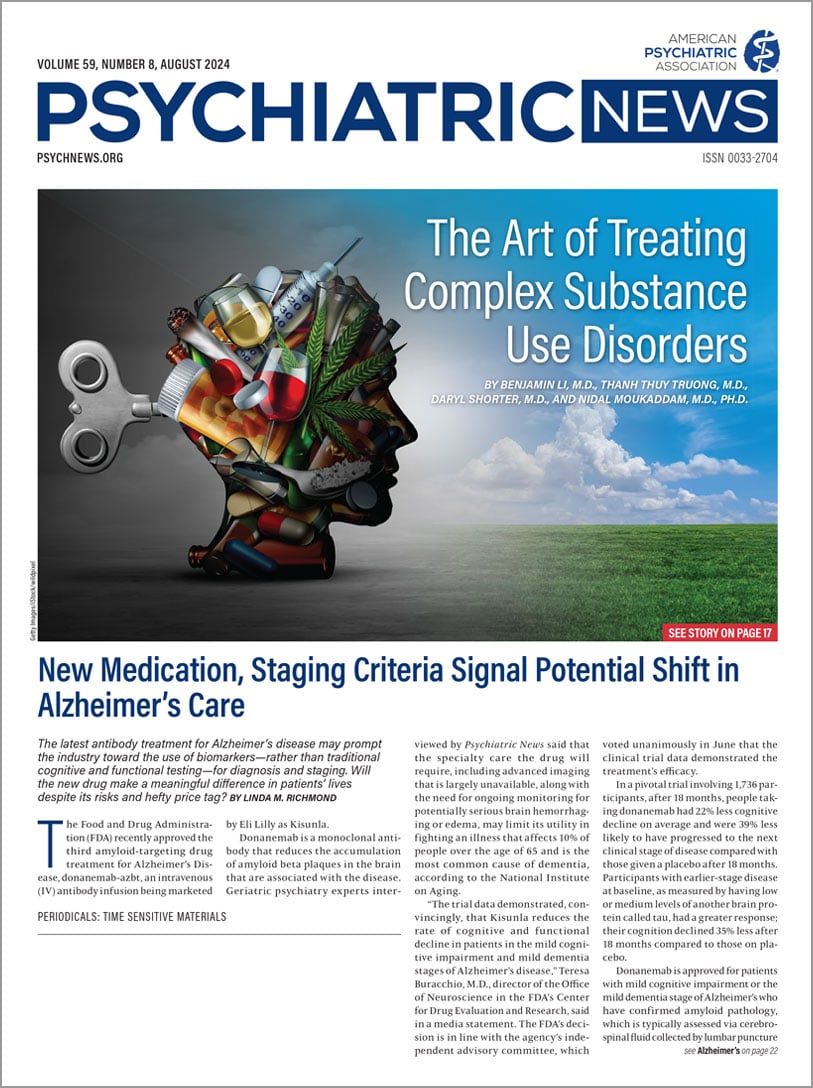Empowering people with accurate information, including data on effectiveness and safety, is the most important service psychiatrists can provide to patients who are curious about psychedelics for the treatment of psychiatric disorders, said Army Maj. Aaron Wolfgang, M.D., an assistant professor of psychiatry at the Uniformed Services University, at APA’s 2024 Annual Meeting.
He is also the novel and emerging therapeutics deputy consultant to the Office of the Army Surgeon General.
Wolfgang and fellow speakers Bryan Barksdale, M.D., Ph.D., a fourth-year resident at the University of Texas Medical Branch John Sealy School of Medicine, and Jennifer Mitchell, Ph.D., a professor of neurology at the University of California, San Francisco, provided an overview of the therapeutic use of psychedelics—LSD, psilocybin, MDMA, and ketamine—and discussed each substance’s background, efficacy data, risk profile, and medication interactions. They also discussed how to counsel patients seeking safe, legal, controlled settings for psychedelic-assisted therapy, such as through clinical trials.
Wolfgang emphasized three principles regarding psychedelics:
•
The distinction between illicit use in nonprescribed settings and approved use in prescribed settings.
•
The distinction between maintenance use of medications to treat a psychiatric condition and use of psychedelics to augment psychotherapy.
•
The analogy of psychedelic-assisted therapy to anesthesia-assisted surgery.
“We want to make a clear distinction between use of these drugs in illicit or nonprescribed settings and their use in controlled settings such as a clinical trial using pharmaceutical grade substances,” Wolfgang said. “There is plenty of evidence that these psychedelics can be harmful in nonprescribed settings.”
Wolfgang and colleagues also discussed how to counsel patients who may be experimenting with psychedelics illicitly by using harm reduction principles. For instance, he especially cautioned against individuals experimenting alone with psychedelics and said those using psychedelics bought off the street should have naloxone available in case the substances are cut with fentanyl or other opioids.
Wolfgang emphasized that the almost uniformly anecdotal evidence of the effectiveness of psychedelics for mental disorders in nonprescribed settings cannot always be trusted: Dosages cannot be confirmed, and a host of confounding variables that may account for treatment response cannot be verified. Similarly, he cautioned against individuals using evidence from closely monitored clinical trials to justify their use in settings in which drugs are not prescribed and safety cannot be assured.
In controlled clinical trials, psychedelics have typically been tested as an adjunct to psychotherapy. How exactly psychedelics assist in psychotherapy is still uncertain, but most are believed to help loosen rigid or tightly held beliefs that may perpetuate repetitive and destructive behaviors, habits, or patterns of thought. This theory has been articulated by Robin Carhart-Harris, Ph.D., a professor of neurology at the University of California, San Francisco, as “
relaxed beliefs under psychedelics (REBUS).”
In contrast, MDMA, which has been found to be safe and efficacious in the treatment of posttraumatic stress disorder, appears to provide a way for individuals to re-experience traumatic events in a more compassionate or less judgmental way.
With MDMA, “subjects are not seeing things or hearing things that are not there, and there’s no ego dissolution or vivid imagery common to other psychedelics,” Wolfgang said. Rather, MDMA may induce a subjective experience of intense love, compassion, and—importantly—self-compassion. “Through this lens of neurochemically mandated compassion and self-compassion, a subject may be able to look back and reexperience certain traumas—whether it is military combat or sexual assault or a car crash,” he said. This can be liberating for individuals with traumas that are emotionally painful to relive.
What can patients typically expect when they seek out a clinical trial for psychedelics?
Wolfgang said prospective participants should receive an extensive medical and psychological screening to exclude those with serious mental illness or medical conditions that may put them at risk. Those chosen for the trial usually have at least three preparatory sessions.
“In the month or so prior to a first medication session, the patient and therapist will meet for preparatory sessions designed to build rapport and trust, educate the patient about what to expect, and explore patient intentions for what they hope to get out of the medication session,” Wolfgang said.
During psychedelic-assisted therapy, he said, patients are typically lying down on a bed or a couch and often listen to a curated music playlist on headphones; therapy sessions are typically six to eight hours long. After each therapy session (there may be a series of them depending on the length of the clinical trial), patients and therapists meet for “re-integration” sessions during which they discuss what happened.
Wolfgang urged psychiatrists who are questioned by their patients about psychedelics to learn more about legal avenues such as safe, controlled research trials. “In these clinical trials, researchers incorporate thorough screening, medical monitoring, and known doses of unadulterated pharmaceutical-grade substances in a highly controlled setting,” he said. ■

